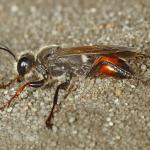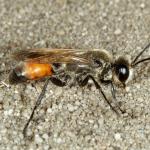Sphex rufocincta misident.
It has been shown by Menke & Pulawski (2000) that the species listed as Sphex rufocinctus in publications since 1975 (e.g. Lomholdt, 1984; Dolfuss, 1991; Bitsch et al., 1997), and which is recorded from the Channel Islands, should be known as funerarius Gussakowskij. This species is only known from the Channel Islands and, as such, does not appear in either Richards (1980) or Falk (1991). This summary of its ecology is drawn from continental literature.
This species is absent from mainland Britain but known from the Channel Islands, where there is a single record from Jersey.
It is known from most of Europe, the Mediterranean basin including north Africa and across Asia to China (Menke & Pulawski, 2000).
The Channel Islands, for a number of reasons, are excluded from the geographical coverage of the British Red Data book (Shirt, 1987) and so this species does not have a conservation status.
Habitat components presumably comprise warm, sandy ground for nest excavation and nearby rough grassland or other herbage within which its prey is sought.
Dollfuss (1991) gives July to September for continental examples.
Nymphs of grasshoppers and bush-crickets (Orthoptera), with 3–5 prey items in each cell (Bitsch et al., 1997).
In keeping with other members of this family, the nest generally comprises a sloping tunnel (about 15cm long according to Lomholdt (1984)) at the end of which is one, or occasionally more, larval chambers.
Bitsch et al. (1997) suggest that this species visits a wide range of flowers from diverse families, including Apiaceae, Asteraceae, Euphorbiaceae, Oleaceae, Rutaceae and Campanulaceae.
Lomholdt (1984) cites the miltogrammine flies Metopia campestris (Fallén) and M. argyrocephala (Meigen) as cleptoparasites. Bitsch et al. (1997) add the non-British bombyliid fly Thyridanthrax perspicillaris Loew.
2016



